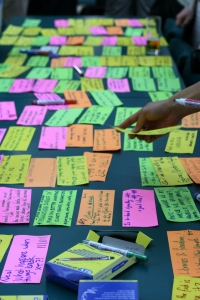Digital skills and scholarship for researchers 5 – getting funded
Almost a year had past since that first conversation between Kaitlin Thaney, Nick Jones, Cameron McLean and myself where we asked:
‘what would Software Carpentry look like if it was delivered as a university course?’
A number of conversations and workshops were had that kept indicating that the thirst and need for this was there, that there wasn’t a clear solution in place, and that the solution was not going to be easy to produce. We knew what we wanted the house to look like, but we needed to find an architect. And of course, money to pay them.
Enter Nat Torkington
Nat organises an unconference called KiwiFoo. He invites a bunch of people to a retreat north of Auckland and lets the awesome happen. In 2015 I was invited, and, by pure luck Kaitlin Thaney was invited too as she was around that time in Australia for a software carpentry instructor training around ResBaz Melbourne. Also invited were Nick Jones, director of NeSi which had recently become the New Zealand institutional partner of Software Carpentry, and John Hosking, Dean of the Faculty of Science, University of Auckland.
The words that Kaitlin Thaney said at one of our meetings came back as if from a loudspeaker: You need to engage with the University Leadership. You need to think strategically.
And KiwiFoo gave us that opportunity.
Kaitlin, Nick and I brought John Hosking into the conversation, and his response was positive. We tried to exploit the convergence as much as we could over that weekend – there are not that many chances to get to sit with this group of people in a relaxed environment and without interruptions or the need to run to another meeting. We had each other’s full attention. And exploit we did.
Back in Auckland, Nick suggested that I talk about the project to the Centre of eResearch Advisory Board. The Centre of eResearch at the University of Auckland is helping researchers with exactly these kinds of issues. Next thing I know, Cameron McLean and I are trying to get everything we learned through the workshops into something more concrete. I talked to those details, and when the Board asked: ‘how can we help you’ I did not know what to say.
Dang.
Luckily, Nick Jones, as usual came to the rescue. We had a chat, and decided to work with me on higher level thinking. I was still missing the big picture that we could offer the leadership. Watching Nick’s thinking process was a humbling joy. I think I learned more from that session than what I did in all the Leadership programmes I was part of. I realised also how far I was from getting to where we needed to get. What is the long term vision? What are the gaps? Why do we need to fill them? How are you going to manage change?
At this meeting we saw we needed to engage with CLeaR, the organisation that provides Professional Development for staff and the group has a lot to offer in instructional design. We had already agreed that this training project should not be focused solely on students, but, rather, should have a broader scope. We produced an initial outline of what we were proposing, and invited Adam Blake from CLeaR to join the conversation and contribute to this document.
I was invited again to the eResearch Advisory Board, and this time I was better prepared. The timing was also perfect. The application window for the Vice Chancellor’s Strategic Development fund was open and I now knew what I needed: support to put an application through. We built a team of key project advisors, each who could contribute something quite specific: Adam Blake, to advise on course structure and to provide support to do the research on the course, Mark Gahegan, Director of the Centre for eResearch, Poul Nielsen, from the Auckland Bioengineering Institute, Nick Jones, from NeSI, and myself as the Project Lead, and the intention of hiring Cameron McLean as project manager. We worked on the application and backed, by the eResearch Advisory Board, it went in.
Our proposal was to develop a training suite, based on Software and Data Carpentry that could be used to be delivered to students and staff in different formats, to support a ResBaz in Auckland in February 2016, and to run a pilot course for students about to enter the research lab on second semester in 2016. We knew our bottleneck was time – people’s time to do the work. We asked for $150,000 in salaries.
In September we got the email: your application has been approved….
But…
The Vice Chancellor’s fund was giving us initially a limited amount of money with the rest of the money contingent on the approval of a needs analysis by the eResearch Advisory Board.
We accepted the offer and hired Cameron McLean as Project Manager (by now he was a trained Software Carpentry Instructor and had submitted his PhD thesis and was waiting for his viva). First order of business, a needs analysis.
Time to go to the library.




leave a comment